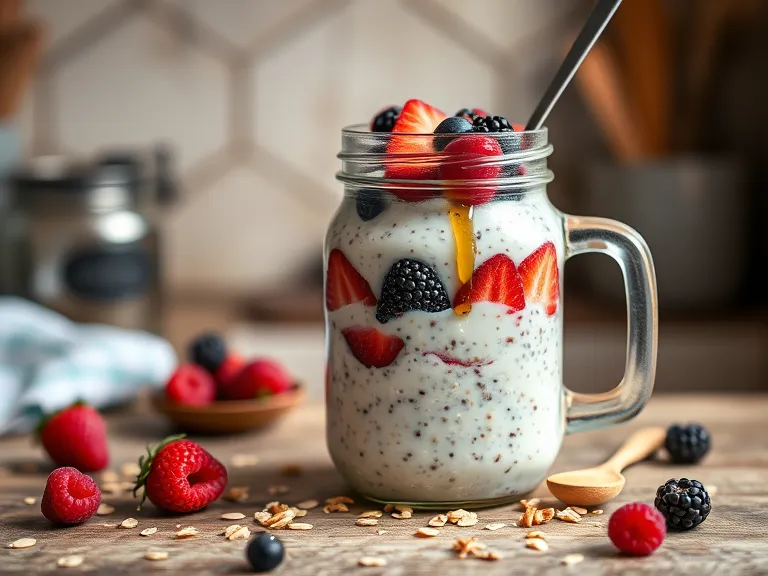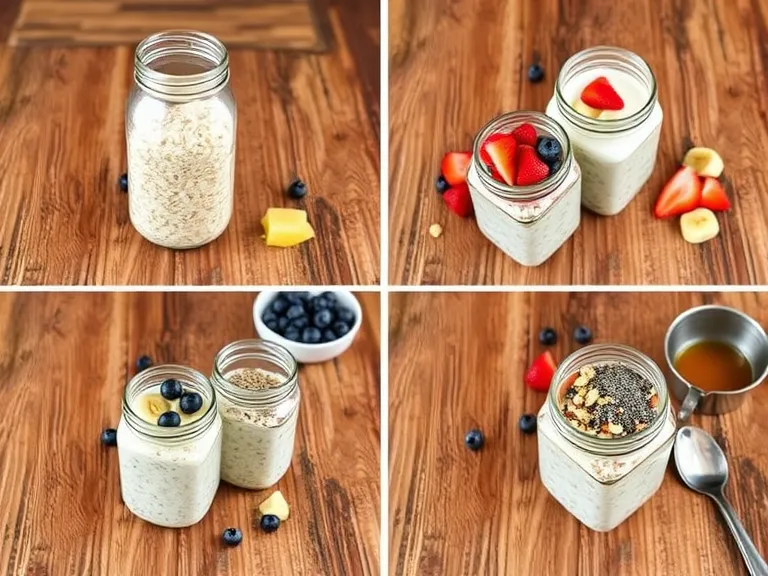Table of Contents
Introduction to Overnight Oats
What Are Overnight Oats?
Overnight oats are a popular and convenient breakfast option that requires minimal effort. Made by soaking rolled oats in liquid overnight, this no-cook recipe results in a creamy, ready-to-eat dish the next morning. The oats absorb the liquid, softening and becoming tender without the need for cooking. Typically prepared with a combination of milk (or non-dairy alternatives), oats, yogurt, and sweeteners, overnight oats can be customized with a variety of add-ins like fruits, nuts, seeds, and spices to suit personal tastes. Whether you’re looking for a healthy breakfast on-the-go or a protein-packed meal to start your day, overnight oats are versatile and satisfying.

Table of Contents
Why Are Overnight Oats So Popular?
Overnight oats have gained immense popularity for several reasons. One of the biggest draws is their convenience. As they require no cooking, they can be assembled the night before, making them an ideal option for busy mornings. All you need to do is mix the ingredients, place them in the fridge, and by morning, you’ll have a delicious, nutritious breakfast waiting for you. This makes overnight oats perfect for meal prepping, allowing you to prepare several servings in advance and enjoy them throughout the week.
Additionally, overnight oats are a great source of fiber, protein, and healthy fats. With the ability to customize them according to dietary preferences, they are a favorite among health-conscious individuals. For those looking to reduce their cooking time, they offer a nourishing meal without the need to spend time in the kitchen each morning.
The Appeal of Customization Overnight Oats
Another reason overnight oats have become so popular is their incredible versatility. The basic combination of oats and liquid can be transformed into an endless variety of flavors and textures. You can adjust the consistency of your oats by playing with the amount of liquid, adding more for a creamier result or less for a thicker, more substantial texture. The addition of yogurt boosts the protein content and gives the oats a rich, creamy texture.
Toppings and mix-ins are where the fun begins. Whether you prefer a classic fruit topping like berries, bananas, or apples, or a more decadent treat like peanut butter and chocolate chips, the options are limitless. Seeds like chia or flaxseeds can add crunch and healthy fats, while spices such as cinnamon, nutmeg, or vanilla extract can bring warmth and depth to the flavor. With these endless combinations, overnight oats never have to be boring, and there’s always a new way to enjoy them.
Health Benefits of Overnight Oats
In addition to their convenience and versatility, overnight oats also provide several health benefits. Oats are rich in soluble fiber, which can help with digestion and heart health. The fiber in oats helps to regulate blood sugar levels, making overnight oats a good option for those with diabetes or those trying to maintain stable energy levels throughout the day. When combined with protein-rich ingredients like yogurt or nuts, overnight oats offer a balanced meal that can help you feel full longer, reducing the temptation to snack before your next meal.
The high levels of antioxidants found in fruits and seeds can further enhance the nutritional value of your oats. For example, adding blueberries or chia seeds can boost your intake of antioxidants, promoting overall health and fighting inflammation.
Essential Ingredients for Overnight Oats
Overnight oats are incredibly versatile, but to achieve the perfect texture and flavor, you’ll need to use the right base ingredients. While the combination of oats and liquid forms the foundation, there are many other ingredients that can enhance the nutritional value, texture, and taste of your overnight oats. Here’s a breakdown of the essential ingredients you’ll need to create a delicious and satisfying bowl of overnight oats.
1. Rolled Oats
The cornerstone of overnight oats is rolled oats, which are whole oats that have been steamed and flattened. They absorb liquid well and maintain a tender yet slightly chewy texture when soaked overnight. Avoid using quick oats or instant oats, as they tend to become mushy and may not hold up as well when soaking. Rolled oats are also the best choice for creating that creamy, satisfying base.
2. Liquid: Milk or Non-Dairy Alternatives
The liquid you use to soak your oats is key to achieving the desired consistency. The general ratio is 1/2 cup of oats to 1/2 cup of liquid, but this can be adjusted based on your preference for thicker or creamier oats. You can use a variety of liquids, including:
- Cow’s Milk: Regular dairy milk adds a rich, creamy texture to overnight oats, providing protein and calcium.
- Almond Milk: A popular non-dairy choice, almond milk is low in calories and has a slightly nutty flavor that complements oats well.
- Oat Milk: Another non-dairy option, oat milk has a naturally creamy texture and mild flavor, making it perfect for overnight oats.
- Coconut Milk: For a tropical twist, coconut milk offers a rich and creamy texture with a subtle coconut flavor. This works especially well for fruit-based or tropical-flavored oats.
- Soy Milk: Another plant-based milk, soy milk is higher in protein than some other non-dairy alternatives and is an excellent choice for a heartier meal.
The liquid not only helps the oats soften but also gives the oats their flavor and creaminess, so choose one that aligns with your taste preferences and dietary needs.
3. Yogurt
Adding yogurt to your overnight oats helps create a thicker, creamier texture while also boosting the protein content. Greek yogurt is a popular choice because it’s thick, high in protein, and has a tangy flavor that balances the sweetness of fruit and sweeteners. If you prefer a dairy-free option, there are plenty of plant-based yogurts made from almond, coconut, or soy milk. Yogurt also provides beneficial probiotics that are great for digestion.
4. Sweeteners
While some people enjoy their oats plain, others prefer a little sweetness. There are various sweeteners you can use in your overnight oats, including:
- Honey: A natural sweetener that adds a touch of floral sweetness and can help balance the tanginess of yogurt.
- Maple Syrup: Known for its rich, caramel-like flavor, maple syrup is a popular choice for sweetening overnight oats. It adds warmth and depth to the oats.
- Agave Nectar: A vegan-friendly sweetener that’s milder in flavor than honey, making it a great option for those with specific dietary preferences.
- Stevia or Monk Fruit: If you’re looking to cut down on sugar, stevia or monk fruit sweetener are calorie-free alternatives that won’t spike blood sugar levels.
The amount of sweetener you add is entirely up to personal taste, but start with a small amount and adjust as needed.
5. Seeds and Nuts
For added texture, crunch, and nutritional benefits, consider adding seeds and nuts to your overnight oats. These ingredients are packed with healthy fats, protein, and fiber, making them perfect for balancing out the meal. Here are some popular choices:
- Chia Seeds: These tiny seeds absorb liquid and expand, creating a pudding-like texture. They’re a great source of omega-3 fatty acids and fiber.
- Flaxseeds: Rich in fiber and healthy fats, flaxseeds can help improve digestion and keep you feeling fuller for longer.
- Almonds, Walnuts, or Pecans: Chopped nuts add a satisfying crunch to your oats, along with a dose of healthy fats and protein.
Nuts and seeds can be mixed in before soaking or sprinkled on top as a garnish in the morning for added crunch.
6. Fruits
Fresh or frozen fruits are the perfect complement to overnight oats. They add natural sweetness, fiber, and essential vitamins. Some popular fruit choices include:
- Berries: Blueberries, strawberries, raspberries, and blackberries are full of antioxidants and provide a burst of fresh flavor.
- Bananas: Sliced bananas add creaminess and sweetness to your oats, making them a filling addition.
- Apples or Pears: Grated or chopped, these fruits add texture and are especially delicious with warm spices like cinnamon.
Fruits can be added before soaking to infuse the oats with flavor or used as a topping once they’re ready to serve.
7. Spices
Spices like cinnamon, nutmeg, and vanilla extract can take your overnight oats to the next level. These ingredients add warmth and depth of flavor without any extra sugar. A dash of cinnamon is especially popular, providing a cozy, comforting note that pairs beautifully with fruits like apples and bananas.
Creative Variations for Overnight Oats
Overnight oats are an incredibly versatile base for creating numerous flavor combinations. You can experiment with a variety of fruits, nuts, seeds, and spices to make your oats more exciting. Here are some creative variations to try:
Tropical Paradise Overnight Oats
Combine coconut milk with fresh mango, pineapple, and a sprinkle of shredded coconut for a tropical-inspired breakfast. This variation adds a refreshing and sweet note, perfect for summer mornings.
Key Ingredients: Coconut milk, diced mango, diced pineapple, shredded coconut
Chocolate Hazelnut Overnight Oats
For those with a sweet tooth, try adding cocoa powder or melted dark chocolate to your oats. A handful of chopped hazelnuts will add crunch and nuttiness, creating a dessert-like experience without the guilt.
Key Ingredients: Cocoa powder, dark chocolate, chopped hazelnuts, honey
Apple Cinnamon Spice Overnight Oats
For a cozy, fall-inspired flavor, add chopped apples and a generous pinch of cinnamon to your oats. A dash of vanilla extract and a drizzle of maple syrup will make this comforting and sweet.
Key Ingredients: Chopped apples, cinnamon, maple syrup, vanilla extract
Savory Avocado and Egg Overnight Oats
For a savory take, add mashed avocado, a sprinkle of salt, pepper, and a hard-boiled egg on top. This makes for a protein-packed breakfast that’s filling and satisfying.
Key Ingredients: Mashed avocado, boiled egg, salt, pepper
Nut Butter and Banana Overnight Oats
Spread peanut or almond butter on your oats for a creamy, nutty texture. Pair it with sliced banana and a touch of honey for added sweetness.
Key Ingredients: Peanut butter, banana, honey, chia seeds

Step-by-Step Instructions for Making Overnight Oats
Making overnight oats is as simple as mixing a few ingredients and letting them sit overnight in the fridge. Here’s a step-by-step guide to help you get the perfect oats every time:
1. Choose Your Base Liquid
Start with a liquid base for the oats. You can use milk (dairy or non-dairy), yogurt, or a combination of both. The ratio is typically 1:1 with oats, but you can adjust based on your preference for a creamier or more liquid texture.
2. Add the Oats
Add rolled oats to your chosen liquid. Make sure the oats are fully submerged to ensure even soaking.
3. Add Sweeteners and Flavorings
Stir in your preferred sweetener (maple syrup, honey, stevia) along with flavorings like vanilla extract or cinnamon.
4. Mix in Add-ins
Add any mix-ins, such as chia seeds, flaxseeds, or spices. This is the time to add fruit or nuts as well, although some people prefer to add fresh fruit in the morning after the oats have set.
5. Stir and Refrigerate
Stir all ingredients together thoroughly. Cover the container and refrigerate overnight (or for at least 4 hours). The oats will absorb the liquid and soften.
6. Top and Serve
The next morning, top with your favorite toppings like fresh berries, nuts, or granola. Enjoy immediately or store in an airtight container for later use.
Troubleshooting Common Overnight Oats Mistakes
Even though making overnight oats is simple, sometimes mistakes happen. Here are some common issues and how to fix them:
1. Too Thick or Too Runny Oats
If your oats are too thick, add more liquid. If they’re too runny, use less liquid or add more oats to thicken them. Adjust the ratio until you achieve your preferred consistency.
2. Soggy Oats
Soggy oats can happen if you use too much liquid or don’t stir them well enough before refrigerating. Make sure to stir them well and use the right ratio of oats to liquid.
3. Lumpy Oats
To avoid lumps, ensure the oats are fully mixed with the liquid. Stir the oats well before refrigerating. You can also try using a whisk to break up any clumps.
4. Unflavored Oats
If your oats lack flavor, it could be because you didn’t add enough sweeteners or spices. Try adding more vanilla, cinnamon, or a pinch of salt for better flavor.
Meal Prep Tips for Overnight Oats
Overnight oats are perfect for meal prep! Here’s how to make your mornings even easier:
1. Batch Prep
Prepare several servings at once by using mason jars or airtight containers. This will give you multiple days’ worth of breakfasts ready to grab and go.
2. Use Containers with Lids
Mason jars, glass jars, or airtight containers work best for meal prepping. They keep the oats fresh, and you can easily store them in the fridge for up to 5 days.
3. Make Custom Portions
Customize each jar with different flavors and toppings, so you have a variety to choose from throughout the week. Keep toppings like fresh fruit or granola separate until ready to eat.
4. Freezing Options
You can also freeze overnight oats in single-serving portions. Simply thaw them in the fridge overnight or microwave them for a quick breakfast.

Serving Suggestions for Overnight Oats
Overnight oats are delicious as is, but pairing them with additional toppings or sides can elevate your meal:
1. Toppings
Add fresh or dried fruit, nuts, granola, or seeds. You can also add a dollop of nut butter or a drizzle of honey for extra flavor.
2. Side Dishes
Pair your oats with a side of scrambled eggs, avocado toast, or a green smoothie for a more filling breakfast. A side of yogurt can also complement the oats’ creaminess.
3. Beverages
For a refreshing morning drink, pair your oats with a cup of fresh juice, coffee, or herbal tea. A smoothie or protein shake is also a great pairing for a balanced breakfast.
Frequently Asked Questions (FAQs)
1. Can I use steel-cut oats for overnight oats?
Steel-cut oats require more liquid and longer soaking times than rolled oats. If you use steel-cut oats, increase the liquid ratio and let them soak for a minimum of 8 hours.
2. Can I make overnight oats without milk?
Yes! You can substitute the milk with plant-based options like almond milk, oat milk, or coconut milk. Yogurt can also be used for a thicker texture.
3. Can I prepare overnight oats for multiple days?
Yes! Overnight oats are perfect for meal prep. Prepare multiple servings and store them in the fridge for up to 5 days.
4. Can I heat overnight oats?
Yes, overnight oats can be heated in the microwave or on the stove. Just add a little extra milk to adjust the consistency if needed.
5. How long do overnight oats last in the fridge?
Overnight oats will last up to 5 days in the fridge if stored properly in an airtight container.

Other Types of Overnight Oats
While traditional overnight oats made with rolled oats are the most common, there are several other variations you can explore depending on your texture and flavor preferences. Here are some other types of overnight oats to consider:
1. Chia Seed Pudding Overnight Oats
Chia seeds are a popular addition to overnight oats because they create a thick, pudding-like texture when combined with liquid. Chia seeds absorb liquid and expand, creating a creamy consistency that works well for those who prefer a more decadent, pudding-like breakfast. You can add fruit, honey, or nut butter to customize the flavor. This variation is also an excellent source of fiber and omega-3 fatty acids.
2. Quinoa Overnight Oats
For a grain-free option, quinoa is an excellent choice. It’s high in protein and gives your oats a nutty flavor and chewy texture. To make quinoa overnight oats, simply substitute quinoa for oats and use your preferred liquid. This is a great option for anyone who is looking for a high-protein, gluten-free alternative to traditional oats.
3. Buckwheat Overnight Oats
Another gluten-free alternative is buckwheat. Despite the name, buckwheat is not related to wheat, making it a great choice for those with gluten sensitivities. Buckwheat provides a nutty flavor and a slightly firmer texture than oats. To prepare, soak the buckwheat overnight with your liquid of choice and top with your favorite add-ins.
4. Oat Bran Overnight Oats
Oat bran is the outer layer of the oat grain and is higher in fiber than traditional oats. This makes oat bran a great choice for anyone looking to boost their fiber intake. Oat bran overnight oats have a smoother, creamier texture than regular oats, making them a delightful breakfast option for those who prefer a soft consistency.
5. Coconut Flour Overnight Oats
For a lower-carb and grain-free option, coconut flour can be used in place of oats. Coconut flour is very absorbent, so you’ll need to use more liquid than usual when making coconut flour overnight oats. This variation is ideal for those following low-carb, paleo, or keto diets. It has a subtle coconut flavor and pairs well with tropical toppings like pineapple and coconut flakes.
Each of these variations offers a unique texture and flavor profile, so feel free to experiment with different grains and ingredients based on your dietary preferences and taste!

